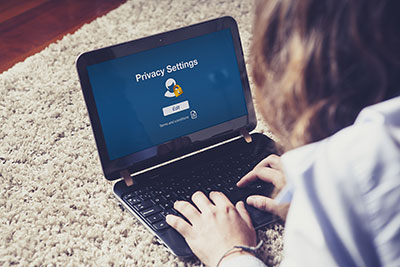Last updated February 2021
Because Facebook’s profits depend on reselling data it collects on its users, it doesn’t prioritize privacy. While the company does offer robust privacy settings, some of its most effective controls are by default turned off, and it’s not obvious where to find them.
Here’s how to minimize what you share with Facebook and other strangers.
 Review and Clean Up Old Posts
Review and Clean Up Old Posts
When you post something on Facebook, who can see it? Your friends? Your friends’ friends? What about all the cat videos and political complaints you posted when you first got on Facebook in the late-aughts? Users are often surprised to learn that many of their old posts are viewable by anyone, or that they’ve been tagged in posts made by others who allow anyone to view them.
To check what strangers see when they pull up your profile, log on and visit your page and click or tap “View As.” You’ll see your page through the eyes of anyone on the internet, including a prospective employer, friend, or ex. See something you don’t want broadcast to the whole wide web world? Delete the post, untag yourself, or change who can see it.
Facebook now offers a way to do this cleanup in bulk, but so far this feature is available only on its mobile app. On your profile page, click the three dots next to “Add Story,” then click “Activity Log,” and then “Manage Activity.” Tap “Your Posts.” From there you can filter your posts and delete or archive them by date range and tagged people. Want to get rid of all posts that are older than five years? Wipe out any pics of an ex? Now you can purge in just a few minutes.
Ratchet Up Privacy Settings
Next, locate Facebook’s “Privacy Checkup” section to review what you share with only your Facebook friends, friends of friends, or the public—your birthday, pages you like, check-ins, cover photo, relationship status, career, phone number, etc.—and other privacy settings. Our advice:
- Hide from the public your birthday, location, phone number, and relationship status.
- Turn on two-factor authentication to reduce the chance of hacks.
- Turn off Facebook’s facial-recognition settings.
- Turn off location settings (otherwise Facebook can compile the location info collected by your devices).
- Turn off Facebook links to search engines. This will prevent someone from finding your Facebook profile page when they search for your name on Google, et al.
- Under “Profile and Tagging,” turn on the option to review posts you’re tagged in so you can see them and approve them before they show up on your profile.
Many companies install Facebook’s business tools on their websites and apps to track visitors’ actions such as searches, purchases, and more. It’s why if you browse for a pair of running shoes at DSW.com, your Facebook newsfeed will soon be overrun with ads for similar kicks.
Facebook lets you halt this type of sharing—but it makes these settings a pain to find. Look for a “Settings & Privacy” section and then “Privacy Checkup.” From there, look for a link that lets you check on other settings. You’re hunting for the site’s “Off-Facebook Activity” page. When you find it—congratulations!—you can see which businesses have shared your information with Facebook and what they’ve shared, delete that information, and manage what gets shared in the future.
Our editor checked his off-Facebook activity and was stunned to find 668 apps and websites listed there—including a complete picture of where he banks, invests, shops, travels, and seeks healthcare. We advise you to clear all past activity and then click to opt out of Facebook’s collection of future activity.
Finally, under the site’s “Memorialization Settings,” tell Facebook what to do with your profile page after you die. You can have it change your profile to a memorialization account, delete your profile, or appoint a legacy contact to manage your profile and keep in touch with friends and family.
Decided to quit Facebook? Keep in mind that you’ll still be connected to the company if you keep Instagram. Facebook acquired the app in 2012.


